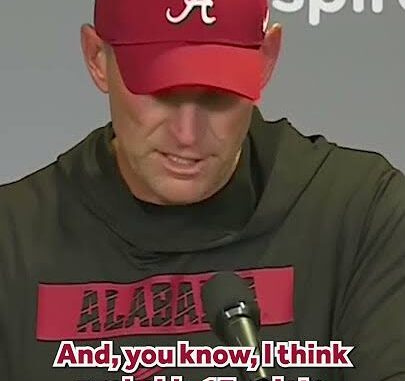
Alabama head coach Kalen DeBoer did not mince words after the Tide’s disappointing loss to Oklahoma on Saturday night. In a game that carried major playoff implications and demanded discipline, execution, and big-moment composure, Alabama instead found itself battling self-inflicted wounds. DeBoer summed it up bluntly during his postgame press conference: “We got killed in the turnover battle.” And in a matchup between two top-tier programs with razor-thin margins, that was the difference.
From the opening kickoff, the Tide looked ready to compete physically, but carelessness on offense and untimely breakdowns stalled momentum before it could ever build. Alabama turned the ball over multiple times in crucial field positions, gifting Oklahoma opportunities they simply didn’t have to work hard for. A fumble on a promising first-quarter drive, an interception deep in their own territory, and a late-game turnover when the Tide were pushing for a comeback all contributed to the unraveling. Every time Alabama seemed to find its footing, the ball was handed back to the Sooners—literally.
DeBoer acknowledged that Oklahoma deserves credit for forcing pressure and capitalizing on mistakes, but he stressed that Alabama made the night far too easy for them. “You can’t turn the ball over like that against a team of this caliber,” he said. “We put our defense in some terrible spots, and eventually that catches up to you.”
Indeed, Alabama’s defense fought valiantly, holding strong on several short-field situations and giving the offense repeated chances to respond. But the Tide were constantly operating from behind—not just on the scoreboard, but in energy, tempo, and confidence. Defensive stops, no matter how impressive, couldn’t mask the emotional drain of watching the offense give away possessions.
Offensively, Alabama struggled to regain rhythm after each turnover. Drives became tentative, play-calling grew more conservative, and players appeared to press, trying to make up for earlier mistakes all at once. DeBoer mentioned that the turnovers didn’t just change the scoreboard—they changed the psychological flow of the game. “When you’re always trying to climb out of a hole, you start forcing things,” he noted. “That’s when mistakes multiply.”
Despite the loss, there were moments of promise. The Tide showed flashes of explosive playmaking, and the defense produced several crucial stops that kept the game within reach. But as DeBoer explained, flashes don’t win games—execution does. And execution was inconsistent all night.
Looking ahead, the head coach emphasized accountability and learning from adversity. He didn’t shy away from responsibility, admitting that coaching adjustments are needed. Turnover-heavy teams rarely win at the highest level, and DeBoer understands that fixing those issues must become the top priority. “We’ve got to be better with ball security, better with decision-making, better with situational awareness,” he said. “That starts with us as coaches and extends to every player on the roster.”
For a program with championship expectations, a loss like this serves as both a setback and a wake-up call. Alabama still has the talent to rebound, but only if they treat this defeat as more than a one-off stumble. As DeBoer reiterated, the Tide didn’t lose because they were outmatched—they lost because they beat themselves in the turnover battle. And in college football, that’s a painful lesson, but one that can sharpen a team if taken to heart.
Be the first to comment